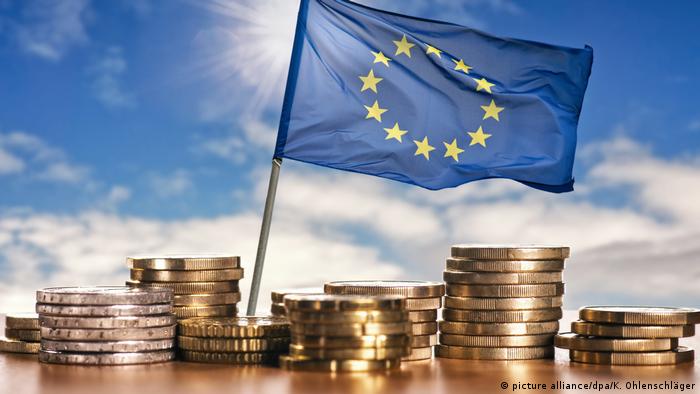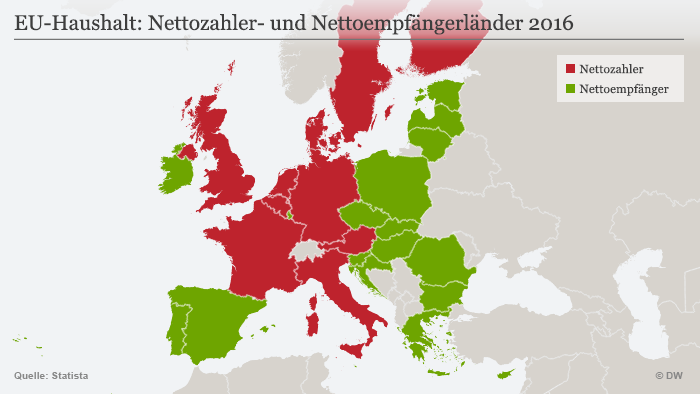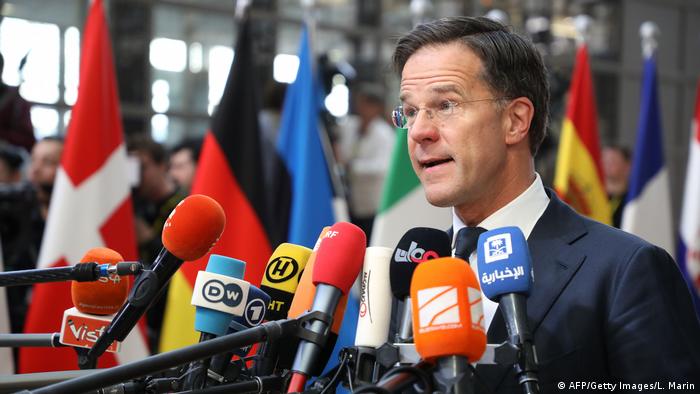The trenches in the EU are low. They run between the North and the South, the West and the East. At its core, it’s about money and solidarity. The new Parliament must adopt the budget.

The love of money plays in the European election campaign only a minor role, but the new Parliament will have the right to deal quickly with the new budgetary framework of the EU 2021-2027. The draft budget-Commissioner, Günther Oettinger, has been long on the table. The planned adoption before the European elections failed. The positions of the EU member States, the Deposit, and the States that get something are apart. Roughly divided, the net payers are more likely in the North and West of the EU. The countries which are economically weaker are there and nursed him back to health, lie to the East and South of the Union.

North against South?
Often, therefore, a “North-South”conflict within the EU, or of a division into Rich in the West, and spoken-nots in the East. This is pithy, but sometimes a little too easy, says the EU expert Janis Emmanouilidis of the think tank “European Policy Center”. “We have conflicts, the Northern States and southern States. We have sharp differences and divisions within member States. You do not need to be very careful so that it represents things to be simple.” The battle of the budget will begin after the election, and the lines are coarse, as budget Commissioner, Günther Oettinger, has already suspected, the idea of his Plan in the last year: “There are some countries that say the total amount was too high. There are other countries, who vehemently oppose any cuts in the agriculture budget.”
Günther Oettinger, will have to Finance more tasks such as border protection and defence, at the same time the United Kingdom after the withdrawal from the EU, so probably 2021, as a net contributor away and leaves an annual gap in revenue of 10 billion euros. Half of them want to compensate for Oettinger in terms of savings, the other half by higher contributions from the remaining net contributors Germany, France, the Netherlands, Italy, Sweden, Finland, Denmark, Austria, Belgium, Ireland. The Dutch Prime Minister, Mark Rutte, is strongly opposed to an increase in the member contributions. The Federal Chancellor of Austria, Sebastian Kurz, agrees with him. Both must take into consideration the populist parties at home, firing up the mood against the EU.

Mark Rutte: More money after the Brexit is out of the question for the Netherlands
Poor against rich?
On the other side of the trench, the net recipients such as Poland, Hungary or Greece. They reject the cuts, a call for more funds and more solidarity. The turn brings the low-country, Mark Rutte, on the palm. In the financial crisis, EU, Greece, Cyprus, Ireland, Portugal and Spain with billions of supported loans. This risk must continue to be strict conditions attached, calls for Rutte: “support for countries with unsustainably high debt burden can only be considered, if the holders of government bonds through debt restructuring, involved in the rescue.” The low countries-and not only reject it, in the meantime, from the banks, the rotten state bonds to hold, to redeem and to save. “It would be unfair to ask taxpayers in other States to pay the bill, if private investors have no more luck,” explained the Dutch Prime Minister again and again.
The populist government in Italy, controls a very different course. The budget deficit is growing, the debts are on the rise. Especially the party “5 star” is of the opinion that Italy pays annually two billion euros net a lot in the Community office in Brussels and the other EU countries, one way or another the sovereign debt of Italy assume or Finance. Because in Italy, as in some other member States, the Motto prevails, “My state first…” it will be difficult to promise in the distribution of funds and financial Solidarity, to find a compromise.

Politics expert Janis Emmanouilidis: ability fades for compromise
“There is no agreement in the more Central questions “
The ability to balance interests have suffered in the EU in recent years due to the debt crisis and the migration crisis, says EU expert Janis Emmanouilidis. “If you dig a little deeper, you will see that the Consensus is crumbling but very often and very quickly, that there are Central issues no agreement and has no possibility to find a compromise,” said Emmanouilidis of the DW. The Growth of right-wing populist parties in the economically weaker countries, but not only, makes the situation better, believes the EU-researcher Karel Lennoo. He is head of the “centre for European policy studies” in Brussels. “The attractiveness of right-wing populists, is associated in some cases with the large difference between the poor and the rich. We certainly see in Italy. We see this in Greece and Cyprus, a little less in Spain. Right-wing populists are safe in the southern States successfully.”
Video 04 view:16 Share
Italy – revolt against the EU
Facebook Twitter google+ send Tumblr VZ Xing Newsvine Digg
Permalink https://p.dw.com/p/3AMeh
Italy – revolt against the EU
The Dutch Prime Minister, Mark Rutte, one of the longest-serving heads of government in the EU, has made another observation. Portugal and Spain had recovered from the financial rescue measures of the EU. The show, that it is not so much the geography but the political attitude in the trenches and Differences in the EU. EU budget Commissioner Oettinger will take into account in the forthcoming negotiations ums hard-fought Budget, roughly a trillion euros in seven years, a further criterion. Withdrawals will be subject to the rule of law and cooperation in the migration policy. Poland and Hungary reject this condition. You need to anticipate cuts in grants.

